My essay on the "Golden Age of Analog" is now published in a special issue of Critical Inquiry on "Surplus Data" edited by Orit Halpern, Patrick Jagoda, Jeffrey West Kirkwood, and Leif Weatherby. Email me if you're paywalled.
 Oh, for days long gone, when intellectuals sparred over symbolic economies and cultural logics. Gone are those heady chats about écriture and the pleasures of textuality. How quaint would it seem today for a critic to proclaim, defiant, that there is nothing outside of the text. Who speaks that way anymore? Who speaks of word, symbol, text, code, economy, social structures, or cultural logics? Of course, many of us still do; nevertheless, this language feels reminiscent of another time. Or, to be more precise, the language of language is reminiscent of another time.
Oh, for days long gone, when intellectuals sparred over symbolic economies and cultural logics. Gone are those heady chats about écriture and the pleasures of textuality. How quaint would it seem today for a critic to proclaim, defiant, that there is nothing outside of the text. Who speaks that way anymore? Who speaks of word, symbol, text, code, economy, social structures, or cultural logics? Of course, many of us still do; nevertheless, this language feels reminiscent of another time. Or, to be more precise, the language of language is reminiscent of another time.
The world is awash in data, yet these days it is much more common to encounter scholarly takes on a series of distinctly nondigital themes: books about affect or sensation; treatises on aesthetics as first philosophy; essays on the ethical turn (turning away from the political) or on real materiality (turning away from symbolic abstraction); manifestos proclaiming, defiant, that there is nothing outside of the real.
A generation ago, the theoretical humanities was fixated on codes, logics, the arrangement of texts, and the machinations of the symbolic order. Today the theoretical humanities is more likely to address topics such as perception, experience, indeterminacy, or contingency. Why in the digital age have some of our best thinkers turned toward characteristically analog themes?